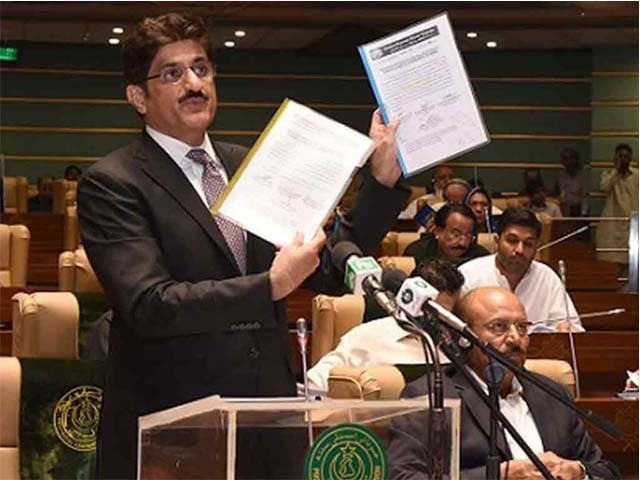Sindh cuts development budget by Rs24b
CM blames cuts on shortfall in federal transfers while presenting budget in assembly

Murad Ali Shah. PHOTO: FILE
The announcement came during the unveiling of the provincial budget for the remaining nine months of the fiscal year, 2018-19, at the Sindh Assembly on Monday.
Sindh Chief Minister Syed Murad Ali Shah, who also holds the portfolio of the finance minister, said that the total outlay for the current fiscal year amounted to Rs1,144.5b.
With regard to the annual development programme (ADP), Shah said that the total outlay was Rs343.911b. Of this amount, Rs252b has been allocated for the provincial ADP, Rs30b for district ADP schemes, Rs46.895b from Foreign Projects Assistance and Rs15.017 from the federal government through PDSP schemes, which will be executed by the provincial government. "The provincial ADP 2018-19 includes Rs202b for 2,226 on-going schemes, and a block allocation of Rs50b for new schemes," said the CM.
According to Shah, the Sindh government had reduced the ADP allocation because it was facing financial constraints in view of the shortfall in federal transfers. He added that the provincial government was largely dependent on the federal government for its revenue receipts, which constitute around 75% of the combined federal receipts and provincial tax and non-tax receipts.
CM Shah added, however, that they had devised a comprehensive development programme. "Our priority is to provide more funds for the on-going schemes and have allocated Rs202 billion for them in the current fiscal year - a 25% increase from last year's amount of Rs151b," he said.
Law and order
The chief minister said that his foremost priority was the maintenance of law and order. "We have restored peace to Karachi and the rest of Sindh. Now we have to sustain it and we will make the necessary investments in human resource and physical assets to achieve this objective," he said, adding that incidents of street crime had increased over the last couple of months and the government was making concerted efforts to eliminate the menace.
He added that the total budgetary allocation for the home department during 2018-19 was Rs102.48b, of which Rs2b had been allocated for development projects. "We are committed to introduce reforms in the police department to make it a more efficient, community friendly and effective force," he said.
CM Shah said that during the current fiscal year, one of the government's aims was to further strengthen the police force by improving infrastructure, especially police stations for which Rs640 million have been allocated. Another Rs80m have been set aside for enhancing the capacity of the investigation branch through the purchase of GSM locators and modern investigation kits. An additional Rs750m have been allocated for the purchase of bullet proof jackets, helmets and arms and ammunition.
Education
The Sindh government is committed to providing quality education, said the CM. During 2018-19, the non-development budget for education has been increased from Rs178.7b in 2017-2018 to a total of Rs211b. On the development side, Rs24.4b have been allocated as compared to Rs17.1b in the last financial year. The bulk of this money will be spent on on-going schemes.
Health
The allocation for the health sector is Rs102.2b on the non-development side and Rs12.5b on the development side.
The chief minister said that his government has provided Rs200m to the Atomic Energy Medical Centre at the Jinnah Postgraduate Medical Centre (JPMC) for the purchase of two Cobalt-60 Radiotherapy units during the last two years.
In 2018-19, Rs78m have been kept aside for the Patient's Aid Foundation for the annual repair and maintenance of the two Cyber Knife units at JPMC.
The provincial government set up the first Cyber Knife Robotic Surgery unit at JPMC under the public- private partnership model in collaboration with the Patients Aid Foundation (PAF) in 2012. "The second Cyber Knife unit will be operational by December 2018 which will enhance the capacity from treatment of eight patients per day to 24 patients per day," said the CM.
The government has also enhanced the grant for the National Institute of Cardiovascular Diseases from Rs5.76b to Rs8.87b for the current financial year. The provincial government will also provide a grant of Rs5.6b to the Sindh Institute of Urology and Transplantation to sustain its services in Karachi and for its new initiatives in other cities.
Malnutrition and stunting
As many as 48% of Sindh's children suffer from stunting or chronic malnutrition, said CM Shah. The Sindh government, in collaboration with partners from the private sector, has devised a plan of action that focuses on international best practices to combat malnutrition by adopting nutrition specific interventions. "We are allocating Rs4.27b for this programme," said the CM.
Potable water and sanitation
Another high-priority area of the government, according to the chief minister, is the provision of clean drinking water and sanitation facilities. Some of the government's initiatives in different districts of the province have focused on the construction of sewage water treatment plants, filtration plants, and Reverse Osmosis (RO) plants to meet the needs of the people.
He said that he has also conceived a desalination plant on the sea, having a capacity of around 300 MGD to produce drinking water.
Energy
Murad Ali Shah said that in order to make Pakistan self-sufficient in terms of its energy needs, Sindh is playing its due role by attracting new investments through a variety of fiscal and monetary incentives.
In the renewable energy sector, the Sindh government has recently negotiated and finalised the `Sindh Solar Energy Project' with the World Bank. The project will finance 20MW of distributed solar photovoltaic panels on rooftops and other available space on and around public sector buildings in Sindh, in a phased manner with an initial target of 200,000 households.
Relief for calamity-hit areas
The CM said that due to untimely and insufficient rain, there is a drought-like condition in various districts of Sindh, including Tharparkar, Umerkot, Sanghar, Kambar Shahdadkot and Dadu. The Sindh government has carried out a survey of these areas and will provide wheat for a period of three months to deserving households free of cost. The health department will set up medical camps and mobile emergency units in the drought-affected areas. Similarly, the livestock department will provide vaccines and cattle fodder for the animals in these areas.
Minorities
According to the CM, the provincial government is committed to safeguarding the rights of minorities as enshrined in Article 25 of the Constitution. For the ongoing fiscal year, the government has allocated Rs1.5b for the completion of on-going schemes. Additionally, an allocation for grant-in-aid for the uplift of social and economic conditions and welfare of minorities in Sindh has been increased to Rs750m from Rs150m in the last financial year.
Published in The Express Tribune, September 18th, 2018.



















COMMENTS
Comments are moderated and generally will be posted if they are on-topic and not abusive.
For more information, please see our Comments FAQ